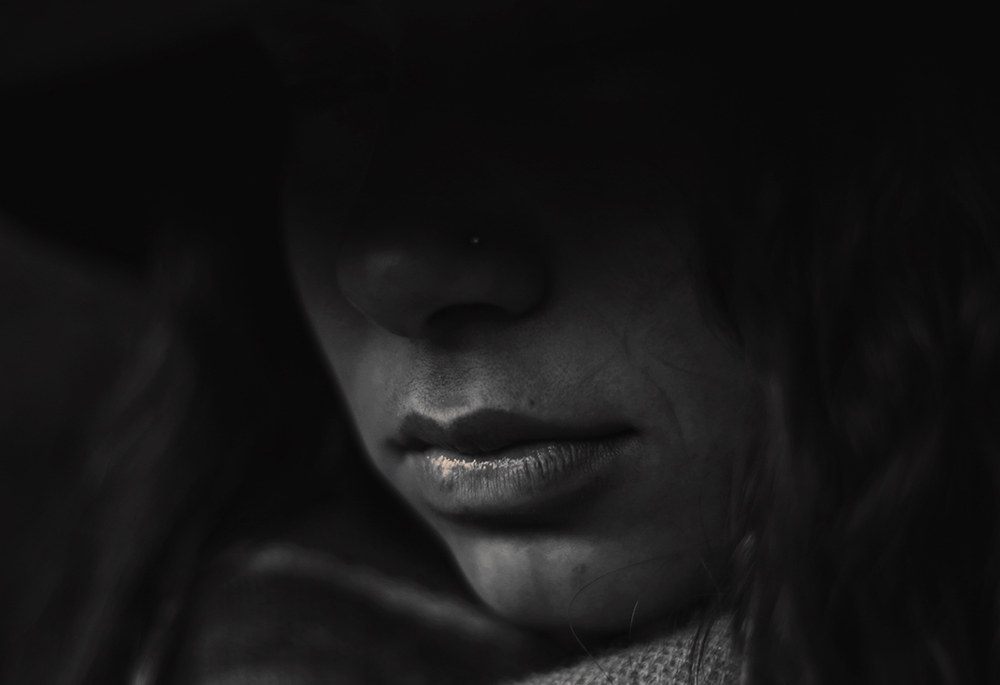
(Unsplash/Zach Guinta)
July 30 is the United Nations' World Day Against Trafficking in Persons. The theme for this year is "Reach every victim of trafficking, leave no one behind." Our sister panelists shared what their congregations are doing to eliminate this grave offense against human dignity by responding to the question:
What have you or your congregation done/is doing to combat modern slavery and trafficking?
______
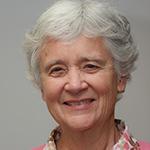
Catherine Ferguson is a member of the Sisters of the Holy Names of Jesus and Mary. First a high school administrator and teacher, she completed doctoral work in international studies that took her to Chile, Peru and Mexico. She interned with Pax Christi in Brussels and served as associate director for Inner City Law Center in Los Angeles. She was founder and coordinator for UNANIMA International, a coalition of several sisters' congregations doing faith-based advocacy at the United Nations. She served as U.S. provincial leader and as congregational leader and is now a board member of Network, a Catholic social justice lobby.
In 2001, the UISG (Union of International Superiors General) Assembly focused women religious everywhere on human trafficking: "We commit ourselves to work in solidarity … to address insistently at every level the abuse and sexual exploitation of women and children with particular attention to the trafficking of women."
Then, most in my congregation, the Sisters of the Holy Names of Jesus and Mary, or SNJM, had little idea about human trafficking.
We had a steep learning curve, but through our international and provincial Peace and Justice Networks and membership in the United Nations-affiliated nongovernmental organization, UNANIMA International, with its advocacy against human trafficking, we learned … and now, internationally and in almost every region here are only some of the ways SNJMs are active in the struggle.
We acted through UNANIMA International at the U.N. to develop and promote an international campaign to stop the demand. We provided educational events at the Commission on the Status of Women and prepared alternative reports for the Commission on the Elimination of Discrimination against Women.
With others, we join the struggle locally and regionally. Sisters of the Holy Names of Jesus and Mary in Lesotho, Peru, Brazil, Canada and the United States have regularly participated in demonstrations and marches to raise awareness about human trafficking. We write letters and sign petitions requesting our various governments enact laws and policies to counter the scourge.
In 2004, our congregation took its first corporate stand — to support ending the human trafficking of women and children who are sexually exploited and pressured into forced labor.
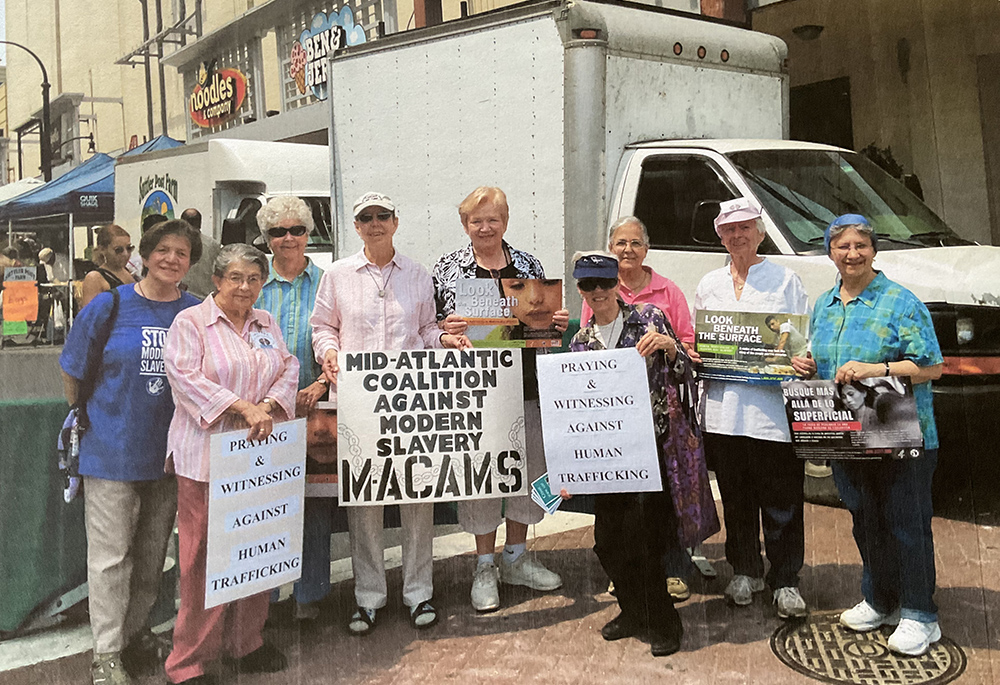
Members of the Mid-Atlantic Coalition Against Modern Slavery demonstrate in Silver Spring, Maryland. Pictured from left are Srs. Carroll Ann Kemp, Frankie Barber, Ann Marean, and Kathleen Keller of the Sisters of the Holy Names of Jesus and Mary; Kate Finan; Sr. Marie Romecko of the Sisters of Notre Dame de Namur; Sr. Marie Pilar Chamorro of the Carmelite Sisters of Charity; Sr. Carol Ries of the Sisters of the Holy Names of Jesus and Mary; and Sr. Carmen Soto of the Carmelite Sisters of Charity. (Courtesy of Catherine Ferguson)
Sisters of the Holy Names of Jesus and Mary in Lesotho, southern Africa, have protected women and girls through awareness raising in their classrooms, parishes and through radio programs.
In Brazil and Peru, SNJMs belong to the national anti-trafficking network of their respective religious conferences with links to the UISG-sponsored international network Talitha Kum. They meet regularly and join anti-trafficking activities. In northeast Brazil, they recently participated in a pamphlet blitz of tourists on the beach. In Peru, an SNJM coordinates the network and was recently involved in forming university students about the situation.
U.S. SNJMs in California's South Bay, Southern California, and Mid-Atlantic regions participate actively in coalitions against human trafficking. The South Bay Coalition to End Human Trafficking offers an annual Survivors' Retreat helping participants develop career skills and overcome the traumas of their experience. In 2016, when the Super Bowl was held there, they organized more than 65 agencies to counter the spike in human trafficking, which often accompanies major sporting events. Their outreach to hotels, motels, taxi and bus drivers was so outstanding that it became a national model for such efforts.
The SNJMs of Quebec were founding members and continue to be active in CATHII, or the Committee for Action against the Internal and International Trafficking of Persons. Through CATHII, the congregation has provided educational dramas, videos and podcasts telling the stories of trafficking and advocating for policies to bring about its end in various national and international venues.
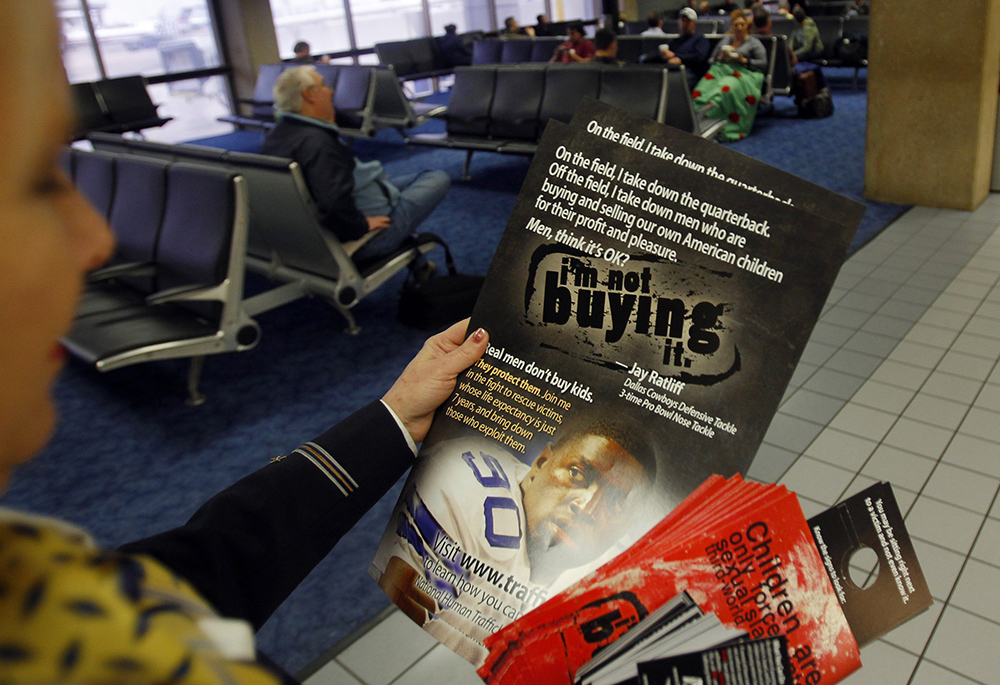
A flight attendant carries educational materials to help airline personnel spot sex trafficking through the Dallas Fort Worth International Airport in Dallas ahead of NFL football's Super Bowl XLV in 2011. Advocates for trafficking victims say big events like the Super Bowl and events surrounding them are a "danger zone" for sex and labor trafficking and domestic violence." (OSV News/Reuters/Brian Snyder)
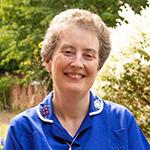
Siobhán O'Keeffe, a native of County Cork, Ireland, is a Sister of the Sacred Hearts of Jesus and Mary (Chigwell Sisters) who lives in Liverpool, England. A registered nurse with a diploma in person-centered care, she has additional graduate work in theology, justice, peace and mission studies. She offers spirituality and dementia care training to religious communities and other groups and writes and speaks on that topic and on prayer and spirituality. She has also contributed to Global Sisters Report. She has served in nursing home management for her congregation, supports a variety of social outreach projects, and is a member of the Catholic Sisters Cognitive Impairment/Alzheimer's Global Initiative, a project of the International Union of Superiors General and the Leadership Conference of Women Religious in the United States.
"Human trafficking is an open wound on the body of contemporary society, a scourge upon the body of Christ. It is a crime against humanity." —Pope Francis
The mission of the Sisters of the Sacred Hearts of Jesus and Mary is to be "joyful co-creators sharing God's unconditional love in our wounded world." We commit ourselves to prophetic witness to the healing, liberating and empowering love of Jesus to the most vulnerable.
We have felt compelled to respond to human trafficking in the following ways:
- We pray each day with the whole church for an end to the abomination of human trafficking. We seek the intercession of St Josephine Bakhita for each one.
- Sisters support victims who have arrived in England in perilous small boats and now seek refuge, companionship and food at Liverpool Foodbanks.
A sister was one of the founding members of the APT — Act to Prevent Trafficking charity in Ireland — whose purpose is twofold: "to raise awareness of the issue of trafficking in persons," and "to work in collaboration with others to prevent the trafficking of women and children for sexual exploitation."
As it states on its website, "To achieve this purpose, APT does the following:
- Focuses on developing links with networks of religious women and men in countries of origin of victims and countries of destination.
- Networks with other similarly committed organizations and action groups, nationally and internationally.
- Looks for ways to raise public awareness of the issue by offering presentations about human trafficking to schools, parishes and groups.
- Seeks ways to protect the rights of victims of trafficking.
- Works with other groups to address the demand for purchased sex, which fuels the trade in human trafficking.
- Prays and encourages others to pray for those trafficked, for traffickers, and for an end to this violation of human rights."
Advertisement
She served in ministry with Ruhama, an "Irish NGO and registered charity that offers nationwide support to women impacted by prostitution, sex trafficking, and other forms of commercial sexual exploitation." According to its website, Ruhama "advocates and engages in policy work on issues related to prostitution, sex trafficking and the experiences of the women we work with."
We are a member of Religious in Europe Networking Against Trafficking and Exploitation, or RENATE, "working tirelessly to rehabilitate victims, free the world of sexual and labor exploitation, slavery and forced organ harvesting."
A sister volunteers at the Rahab Safe House in London empowering the women through her compassionate care of each one.
I support an Iranian couple who escaped with their lives from the oppressive Iranian regime. God is ever faithful; they are looking forward with joy to the birth of their first baby later this year.
May we be ever true to our call to be "joyful co-creators sharing God's unconditional love in our wounded world."
[Editor's note: A version of this response previously appeared here on the author's personal website.]
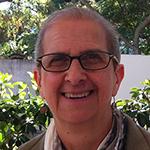
Caroline Price from New Zealand is a member of the Good Shepherd Sisters in Melbourne, Australia. Before entering the community, she served with the Royal New Zealand Air Force for 12 years in administration and flight operations. Since making final vows in 1990, she has ministered in New Zealand and in Rome at the Good Shepherd Generalate. She established the congregation's International Secretariat for Justice and Peace, which worked closely with their International NGO Office at the United Nations, and has served as area community leader for the sisters in Victoria, Australia. Currently, she is a member of the province leadership team.
The world acknowledges the International Day against Trafficking in Persons on July 30.
One would think that in a modern, affluent country like Australia, the trafficking of people would not be happening. Sadly, it is not so. Australia and Aotearoa New Zealand are modern economies, but trafficking continues to happen. Recent research commissioned by human rights group Walk Free reports there are an estimated 41,000 people living in modern slavery conditions in Australia, an increase from 15,000 from a 2018 report.
People have come to Australia and Aotearoa or New Zealand [Aotearoa is its Māori name] from the Pacific on work visas and found themselves enslaved. The latest Global Slavery Index notes that worldwide there are approximately 50 million people now living in modern slavery — 10 million more than five years earlier. Around 22 million are trapped in forced marriages, and almost 1 in 4 in forced prostitution — 80% of those are women. These are horrifying statistics.
One of the Good Shepherd Sisters International Position Papers focuses on trafficking and Good Shepherd Sisters are involved with people who are trafficked in Asia, Africa and Latin America. Cross-border trafficking is challenging. It is an area of ministry for our sisters and partners in mission across the globe. Our nongovernmental organization, or NGO, at the United Nations focuses on trafficking and advocates for women and children.
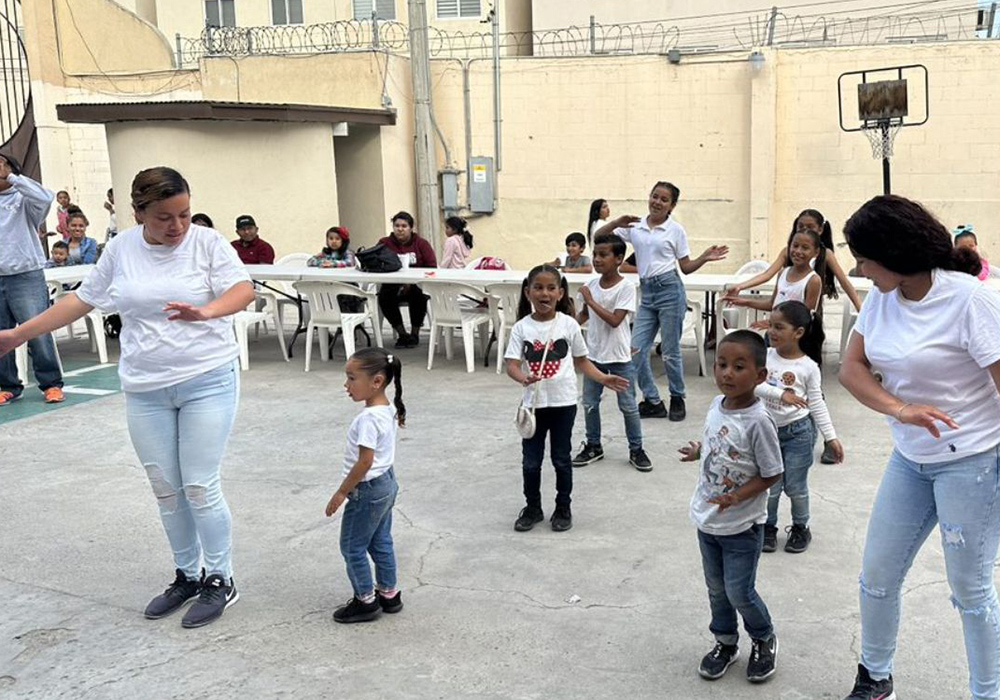
Kids dance during a fun activity at Casa Eudes in Tijuana, Mexico. (Courtesy of Caroline Price)
In 2021, Good Shepherd responded to cross-border migration in Tijuana, Mexico, setting up Casa Eudes, a community center that supports women and children and helps families rebuild their lives.
Open borders between India and Nepal mean illegal trafficking is rampant. In Nepal, the Good Shepherd Sisters work in trafficking prevention. Through Opportunity Village, they provide opportunities and training in health and education for disadvantaged young girls, women, and the sick in the Pokhara area. Prevention of poverty and trafficking is the aim.
Good Shepherd Sisters also run support programs for trafficked people in Taiwan and Macau. Parts of the congregation are involved in the network with Talitha Kum, an international network of religious congregations.
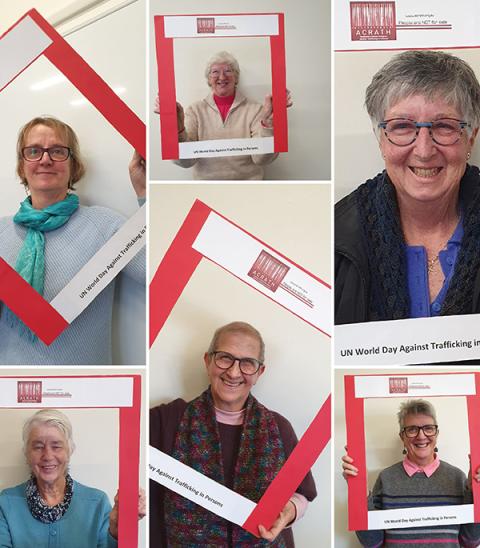
Victorian members of Australian Catholic Religious Against Trafficking in Humans, showing their support for the U.N. World Day Against Trafficking in Persons in 2021 (Courtesy of ACRATH)
In Australia, Good Shepherd Sisters don't work directly with people who are trafficked; we are members of Australian Catholic Religious Against Trafficking in Humans, or ACRATH, which assists in education, advocacy and support and works with other NGOs and state and federal governments to address the issue. Recently, advocacy over 17 years bore fruit for a group of workers from Vanuatu who received wages that had been kept from them. In May 2023, the Australian government allocated funds so victims and survivors of human trafficking can access support without involving law enforcement. A momentous achievement! This gives families safety and protects their immigration status. Their stories have informed advocacy over the years.
Advocacy is dynamic and painstaking work, and it does, over time, bring about change!
ACRATH's work gives me hope that through advocacy and support, things can change. It is never easy but consistent and persistent advocacy for the rights of trafficked people is the call for Gospel justice.
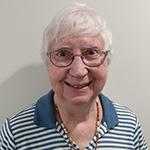
Judith Sheridan is a Marist Missionary Sister from Massachusetts. She has worked in nursing or pastoral counseling in the United States, Jamaica, New Zealand, Australia, Bangladesh and Bougainville in Papua New Guinea and lived and worked cross-culturally with sisters from all over the world. In her congregation, she designed and administered their U.S. Global Justice and Peace Office, co-directed a residence for women victims of trafficking, and served as assistant provincial and provincial superior of the U.S. Province.
When the Missionary Sisters of the Society of Mary (Marist Missionary Sisters) began to research how to serve the victims/survivors of human trafficking in the San Diego area, we discovered that the No. 1 need was housing, leading us to open Mary's Guest House in 2005. Today, so many years later, housing continues to be the greatest need.
Mary's Guest House can house up to five female guests, and it is staffed by two Marist Missionary Sisters who are on the premises 24-7. Women come to us after they are rescued from dangerous situations and enslavement. They are rescued during law enforcement raids by police, the FBI, or Homeland Security at the borders. Some manage to escape their captors and are helped by a good Samaritan. Then, the Human Trafficking Hotline, or the emergency shelter of Marisa Ugarte assesses them. If they need long-term shelter, they are referred to us for housing and services.
These women come to us bewildered, some unable to speak English and with only a few clothes. They are worried and afraid. Maybe she attempted an illegal border crossing and has been detained for months. Perhaps she was arrested and imprisoned for prostitution until she was certified as trafficked and brought to our house. Women are often in shock or drug or alcohol withdrawal. The situations vary, but it takes time for women to adjust. Many of our residents live in fear for themselves and their families, whom their captors threaten to harm if they escape or cooperate with the police.
In this shelter, I met Renee (not her real name) who bravely escaped abuse under cover of night and across borders until she was captured and sent to a California detention center. Overworked social workers and immigration caseworkers recorded her story in 60 or more pages to prove trafficking to clerks, lawyers, judges, etc. She waited every day for eight months. Since English classes weren't offered, she learned Spanish. When she was freed, she was unprepared for "normal" life. She had no money.
Renee came to our "safe" house, and it took time to gain her trust. It took caseworkers, immigration representatives, lawyers, doctors, FBI, etc., to assist her during this transitional period. English, GED, job training and employment were essential to help her become self-sufficient and achieve her goals.
I saw her many times on her knees, Bible on the floor, sobs mixing with her language, revealing a tortured soul before God. Psalms of powerlessness and desperation coming alive. Her trauma relived in her brother fleeing government forces in her homeland, breaking her heart. She couldn't help him.
I sat with her as she fought depression, crying: "I don't know who I am. Who am I?" The words God gave me:
You are a person who has suffered much but has been given deep strength to carry on; your spirit is strong; it is always speaking gentle words of encouragement, affirmation, and hope. God wants peace for you, a beautiful child of God. This is who you are.
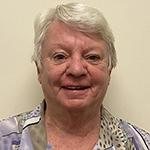
Nuala Patricia Kenny is a native New Yorker and a Sister of Charity of Halifax, Nova Scotia, Canada. She is a physician, pediatrician and bioethicist, who practices, teaches and works at several hospitals in Canada. She has received many honors for her work in child health, medical education and health policy. Past president of both the Canadian Paediatric Society and the Canadian Bioethics Society, she was chair of the Values Committee of the 1997 Prime Minister of Canada's National Forum on Health. She has authored numerous papers and several books.
My congregation has a long and proud history of educating and empowering women, which was continued in our 2008 Corporate Statement:
We Sisters of Charity of Halifax, called to be prophetic women in a world wounded by violence … stand together in a time when we hear the silent cries of victims of human trafficking, especially women and children taken for the purposes of sexual exploitation and forced labor. We commit ourselves to work to eradicate this global human rights violation and affirm the dignity of all human beings.
While many sisters are involved in this work, two notable examples convey its depth and breadth and witness to the need for systemic and cultural shifts in attitude.
In Vancouver, British Columbia, Sr. Nancy Brown has worked in domestic abuse and for 20 years at Covenant House serving homeless youth. She serves on many committees, including the Canadian Council of Churches Sexual Exploitation Working Group. She has a special calling to ensure Canada keeps its equality law which criminalizes buyers, not prostituted persons, and provides exit strategies, and rejects the legalization of prostitution.
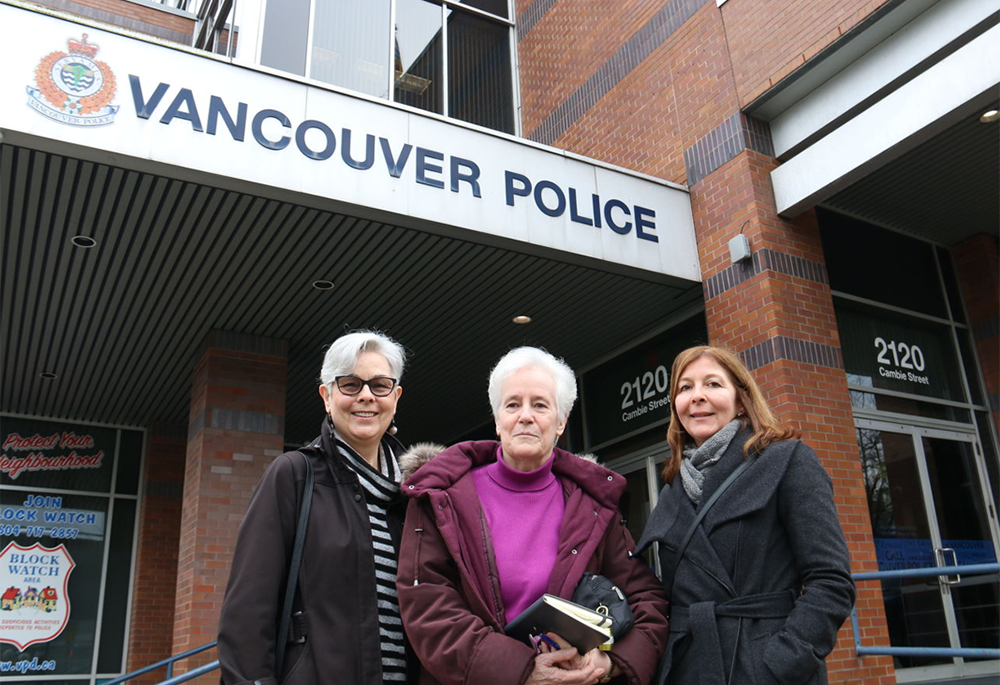
Sandra Harrison, Sr. Nancy Brown of the Sisters of Charity of Halifax, and Evelyn Vollet are pictured leaving the Vancouver Police Department after police announced the arrest of 47 men for trying to pay underage girls for sex. In Canada it is illegal to purchase sex from anyone. (Courtesy of Nancy Brown)
In New York, Sr. Joan Dawber has collaborated with women religious to provide housing for women survivors of human trafficking. She founded LifeWay Network in 2007; by 2016, two houses offered safety and security for 16 women. They provide survivors with the resources needed to rebuild their lives. Each survivor is provided with a safe, supportive and nurturing housing environment, helping them to move towards a renewed life of freedom and independence. She helped found the New York Coalition of Religious Congregations Stop Trafficking of Persons project, which provided support for safe housing and educational programs from its beginning because collaboration is essential in cultural change.
Sister Joan is also one of the founding members of U.S. Catholic Sisters Against Human Trafficking, "a collaborative, faith-based national network that offers education, supports access to survivor services," and advocates to eradicate this example of modern-day slavery. As a member of Talitha Kum International, they are connected to a global network of women religious working to end human trafficking.
As educators, our sisters know that it is critical to educate the general public on this complex and tragic issue. Their educational programs have worked with schools, parishes, women's groups, businesses, hospitals, law enforcement officials and policymakers.
They have also worked with episcopal groups at the highest levels. In April 2019, Sisters Nancy and Joan participated in an international Conference Pastoral Orientations on Human Trafficking in Rome, promoting a Christ-like response to women victims of sexual violence and exploitation.







